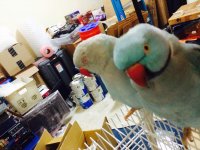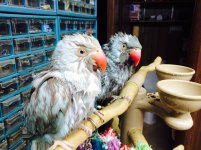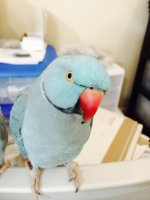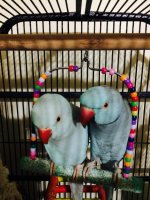WhySoSerious
New member
- Jul 13, 2013
- 5
- 0
Hello! I have a few questions about my pair of Indian Ringnecks. They have been a pair for about 8 months and they both love each other A LOT! They will scream extremely LOUD if I only take one and not both. The male's name is "Sky" and is 2 years old. The girl's name is "Angel" and she is around 1 year and a 1 month. She was given to me because her owner had left for important reasons for some time. They both love me until a few months ago. The female has become aggressive and very loud after 3 months when she was give to me. She really loves to be pet but doesn't like to be held. The male stills loves being held and petted. My questions are the following:
1.) What are somethings to help her become less aggressive?
2.) What are somethings that can help them both become less loud? They have some toys but I am planning on buying more in the future.
3.) Will they able to breed? Or should I wait until she matures a little more and then introduce a nest?
4.) What are some good nutritional and tasty foods that I can give them instead of seeds and fruits/vegetables?
Thank you all for the help!

1.) What are somethings to help her become less aggressive?
2.) What are somethings that can help them both become less loud? They have some toys but I am planning on buying more in the future.
3.) Will they able to breed? Or should I wait until she matures a little more and then introduce a nest?
4.) What are some good nutritional and tasty foods that I can give them instead of seeds and fruits/vegetables?
Thank you all for the help!



